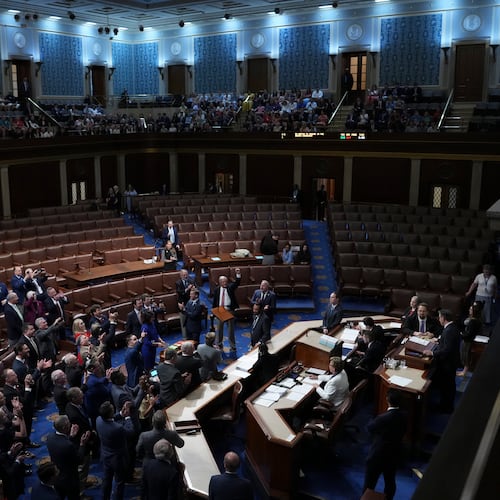On Feb. 20, 1864, Confederate and Union troops clashed at the Battle of Olustee, 50 miles west of Jacksonville. In the aftermath of the battle, one of the darkest moments of the Civil War occurred.
According to accounts from both sides, roaming bands of Confederate soldiers murdered African-American Union soldiers who had been wounded in the conflict.
On Aug. 15, 2011, this tragic incident, oddly enough, became the focal point in the contentious debate regarding whether to rename Harris Street in downtown Atlanta for renowned architect John C. Portman Jr. The namesake of Harris Street, John L. Harris, was a city of Atlanta attorney, a judge and a state representative. As it turns out, he was also a lieutenant colonel in the 4th Georgia Volunteer Cavalry, which participated in the Battle of Olustee.
Prior to the vote, supporters of the renaming distributed a document to members of the City Council that accused Lt. Col. Harris of commanding the troops that engaged in the atrocities at the Battle of Olustee. But according to individuals who have studied the battle, there is no credible evidence that Lt. Col. Harris was even at the battle. Moreover, there is no evidence, according to these historians, that members of the 4th Georgia Cavalry participated in the murders.
Ultimately, the City Council voted 8-6 to rename the street “John Portman Boulevard at Historic Harris Street.” Were any of the City Council members who voted in favor of the change swayed by the document? Unfortunately, we may never know.
But why this discussion of a Civil War battle during a contemporary street renaming debate? There are many practical considerations to take into account when contemplating a street name change, such as the inconvenience and confusion to the public; the cost to businesses and residents on the street to change their contact information; the cost to the city and MARTA to change street signs; and the list goes on.
Indeed, in the case of Harris Street, the name change was vehemently opposed by the Atlanta Downtown Neighborhood Association, Neighborhood Planning Unit M, the Atlanta Urban Design Commission and the Atlanta Preservation Center. Many Atlanta residents voiced their opposition, but the City Council renamed the street anyway.
Mr. Portman has done great things for the city of Atlanta and is certainly deserving of recognition. But why not a plaza, a park or honorary street sign toppers similar to those used in other cities like New York? There are many less disruptive ways to pay tribute to Atlanta’s contemporary heroes without inconveniencing the public and spending taxpayer money in the process.
Additionally, as evidenced by the shameful document circulated prior to the vote, street name changes may lead to hateful and divisive rhetoric that has no bearing on the real issues at hand.
Clearly, the purpose of the document was to try and dishonor Mr. Harris by tying him to a painful aspect of our nation’s history and thereby render him unfit for recognition. But many of Atlanta’s streets may have been named for individuals who have ties to this particular era. Does this mean we should change them all?
Just in the last year, the Atlanta City Council renamed Fair Street, Raymond Street and Harris Street, and tried unsuccessfully to rename Cone Street.
Before that, the council eradicated the names of dozens of other streets including some named for Atlanta’s earliest pioneers such as Hardy Ivy and John J. Cain. In response to these renamings, the Atlanta Preservation Center has listed Atlanta’s historic street grid as the single most endangered aspect of Atlanta history.
It has often been said that if we fail to remember the past, we are doomed to repeat it. So while we do a disservice to our current residents by engaging in costly and confusing street renamings, we do an even greater disservice to future generations of Atlantans by rewriting and renaming our history.
Atlanta has always been more adept at dealing with the difficult issues than its Southern counterparts. But if we continue to eradicate indelible references to Atlanta’s past such as street names, we run the risk of being known not as the “city too busy to hate” but rather as the “city too timid to remember.”
W. Wright Mitchell is an Atlanta attorney.
About the Author
Keep Reading
The Latest
Featured


